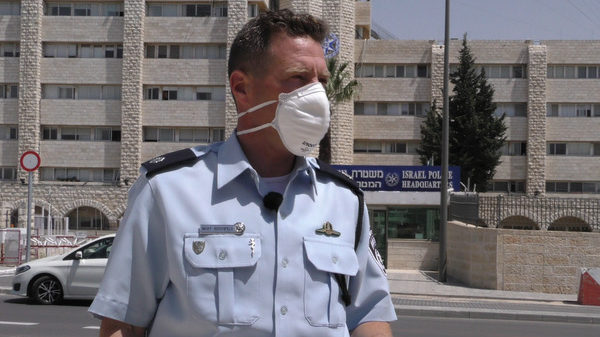Israel Police Spokesman: ‘The More the Transparency, the Better the Reporting’ (VIDEO INTERVIEW)
Supt. Micky Rosenfeld, spokesperson to the foreign press for Israel’s national police force, speaks to The Media Line about the duties, perils – and rewards – of the job
Unlike most countries, Israel has one police force, a national force covering everything from terrorism to crime to community relations. In this era of pandemic and social upheaval, it is also busy enforcing coronavirus directives and keeping the peace at almost nightly protests.
As much of this work often has the full attention of the media – including foreign media outlets from countries near and far – the spokesperson for the police force becomes a familiar face very quickly. For the foreign press, that face belongs to Supt. Micky Rosenfeld, who speaks with The Media Line’s Felice Friedson.
The Media Line: As the Israel Police’s longtime national spokesman to the foreign media, Supt. Micky Rosenfeld is one of the nation’s most recognizable officials and, indeed, the news industry’s “go-to-guy” for the unending cycle of breaking news. We invited Supt. Rosenfeld to join us at The Media Line to meet the man rather than the crisis. Welcome, Micky Rosenfeld, to The Media Line!
Micky Rosenfeld: Thank you very much!
TML: Unlike what most viewers are used to, Israel has a national police force rather than local law enforcement agencies in each of its cities. Apparently, that puts you on the job if anything breaks anywhere in the country, not just the capital. How do you manage?
MR: Well, first of all, the Israeli National Police is unique in that it is one national police force. 24/7, our units are dealing with a number of different areas. First of all, counterterrorism and preventing any attacks that take place, whether it is from the northern border, the Lebanese border, the Syrian border, or all the way down the Jordanian border heading back down to the south, to Eilat and the Sinai region, where there are constant threats. We have 29,000 police officers who are constantly patrolling, constantly preventing those terrorist attacks, and at the same time [undertaking] increased [anti-]criminal activity preventing internal issues such as regular crime, organized crime, illegal weapons, and regular police activity with the communities across Israel.
TML: Have you seen an increase in these areas during the COVID-19 pandemic?
MR: Well, I would say this is a unique period. Not just for the Israeli National Police but also for the Israeli government making tremendous amounts of decisions. The Israeli National Police is the organization that is part of the chain influencing those decisions. So we have seen over the first wave, which was more or less February/March, when we saw the COVID-19 hit Israel, we saw an increase in violence, an increase in protests, an increase in police activities. At the same time, we dealt with hundreds of people who had been unfortunately confirmed with [having] COVID-19. We are in the heart and the peak of the second wave; we’re seeing a decrease in the numbers, and I think this is due to the fact that from the first wave and the second wave, we’ve changed our police tactics on the ground. We’ve mobilized our units to different areas; we’re working closer with the community to get the message out about COVID-19, keeping social distancing, which is absolutely necessary, absolutely vital to prevent the spread of COVID-19, and units in public areas at all times.

Supt. Micky Rosenfeld briefs police officers enforcing the country’s coronavirus guidelines. (Photos by Raymond Crystal/The Media Line)
TML: Unfortunately for Israel, its police force must be tasked with issues of terrorism and national security as well as what other countries would see as traditional police work. What’s the primary role of police? And at what point do you tell inquiring reporters to take it up with the army?
MR: Our responsibilities today in Israel are 80% carrying out police regular activities and 20% working on terrorism, which is very different to previous years and the Second Intifada in the years up to 2010, where it was more or less 80% counterterrorism and 20% criminal-related issues. Things have changed. Today, the Israeli National Police force is working much closer together with the community. We are responsible for [taking care of] every terrorist attack that happens inside Israel; every possible infiltration, whether it’s from the borders or whether its immediately from within inside any of the Palestinian areas, such as Jenin, Hebron, Bethlehem where we’ve seen terrorist attacks. We have constant police operations and Border Police operations that are taking place inside those specific areas to get to those terrorists before they can reach inside a part of cities such as Jerusalem and Tel Aviv. And that is something that is taking place around the clock, all the time, even though we’re at the same period of dealing with COVID-19, working together with all the different communities – the Jewish communities, the Christian communities, the Muslim communities, and trying to work closely with the leaders getting the message out and making sure that people are being safe as much as possible, and that is our main emphasis, where we are at the moment.
TML: Do you ever feel that you can’t handle a 24-hour [news] cycle because too much is happening on different borders and in different communities?
MR: Well, one incident leads to the next. It’s a question of time here in Israel until the next incident takes place, whether it’s criminal or whether it’s terrorist related. Just over the last 24-48 hours, we saw IDF activities on the Lebanese border, on the Syrian border. Rockets were fired into the city of Sderot, down south, where our police bomb disposal experts were the first responders to arrive at the scene and dealt with and defused what was left, and keeping people safe in the city. I think that the tasks that we have are multiple tasks. Our units are very well-trained to go into the same mode of dealing with terrorism, but immediately, if necessary, we can respond to a burglary or a vehicle that is stolen and taken into a Palestinian area. The same units down south can respond and deal fully with that incident, closing off the area, responding and, if necessary, arresting and, even if we need to, engaging with those terrorists. Even if there is a full terrorist attack taking place at the northern border at the same time. That is what is unique about the Israeli National Police. We can respond to different incidents at different times, and of course on different levels.
TML: Speaking of civil matters, the police has had its hands full with night after night of political demonstrations expressing displeasure with the prime minister. With police under attack in the United States, how difficult is it for police [here] to control such confrontations without becoming the issue?
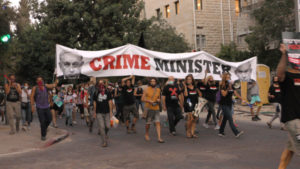
Demonstrators seeking the resignation of Prime Minister Binyamin Netanyahu, on trial for alleged corruption, march to the Knesset, Israel’s parliament, on July 22 along a Jerusalem street closed off by police.
MR: Well, the Israeli police are a neutral organization. We receive requests [for demonstrations]. We [issue permits]. And the protests are organized in full coordination with the Israeli National Police. To give you an example, outside the Prime Minister’s [Residence], we mobilized over 1,000 police officers, including undercover units, in order to make sure that the protests would take place [only] at that specific area. More than 15,000 people took part in those gatherings. We have to make sure that we are securing the protesters [and] at the same time preventing anyone from attacking them. Therefore, our units were at the scene as well as carrying out operations – undercover operations, tracking individuals from other parts of Jerusalem to prevent them from making their way in those areas. In general, I can confirm that in the last month of protests that have been taking place, and there is no differentiation whether it is pro or against, we have made 85 arrests of individuals who have caused public disturbances and unfortunately attacked police officers at those protests, which turned violent towards the end.
TML: Given the size of the demonstrations, there seem to have been few arrests. Who is well behaved, protestors or police?
MR: Well, the Israeli police respond exactly according to what takes place at the scene. If the protesters keep law and order and carry out the protests in a respectable manner, our units won’t even respond…. The protests continue until a given time that is coordinated ahead, so previous times were 12:30, 1:00 o’clock in the morning, the end of the protest. Unfortunately, those that wanted to break the law, those that wanted to confront our police officers who are at the scene, waited around and we responded accordingly, phase by phase. The tactics that we use are very careful and very cautious to protect our officers from No. 1) violent incidents and No 20 [the pandemic, as] we don’t want anyone to get unfortunately confirmed with the coronavirus.
TML: You brought up social distancing. How do you maintain that during a demonstration where many of the demonstrators are not adhering to it?
MR: Well, first of all we are making constant contact with the demonstrators. Our officers are on the ground patrolling the different areas and we even gave out 200 masks for example, to people who were at the demonstrations and did not keep to the specific rules and regulations both of the Ministry of Health, the Israeli government rules, and of the Israeli National Police at the scene. If necessary, we remove individuals from the protests and, if necessary, we can also make arrests, but the aim is to try and understand and work together with the public, tell them to keep social distancing and hand out masks. We’ve also given out fines to more than 150 people on one specific evening. But in general, we are seeing that the public is abiding by the specific rules and regulations of the Israeli National Police and the Ministry of Health.
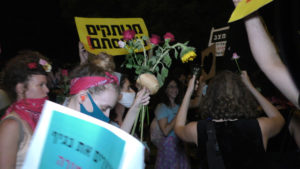
Anti-Netanyahu protesters rally for his resignation on August 11 outside the prime minister’s official residence in Jerusalem.
TML: The COVID-19 pandemic has obviously created new stresses and difficulties you haven’t previously experienced. What’s the worst part of it?
MR: The worst scenario that could be for the Israeli police would be if our officers would have to go into isolation and they would be affected and confirmed positive with COVID-19, because then our officers wouldn’t be able to serve the communities and the people and the public, and that is our main emphasis at the moment. So we are doing everything possible to make sure that our officers are safe – both in terms of their training and in terms of their police patrol. The social distance element is absolutely vital for their safety and the public’s safety.
TML: How many officers have come down with COVID[-19]?
MR: Until now we’ve had over 100 officers confirmed with COVID[-19], and we’ve had at peak periods more than 800 that have been in isolation. A large number of them are already back to full police activities, and that’s behind us, but we have to be super careful…. For example, we have our officers that are working out in the field. Less officers that are working in the offices as well, but that is something that we have to make sure continues. I think it is a long-term issue that is being thought and implemented.
TML: Micky, early on during the coronavirus outbreak, police bore the brunt of jokes of chasing down citizens not wearing masks rather than chasing criminals. Was that a fair characterization?
MR: I don’t think so and I’ll tell you why: Our officers are there in order to be in public places, train stations, malls, bus stations, on the beach areas. We make contact with the public. We’re speaking to people openly. We’re making sure that if someone’s not wearing a mask… this is the new law! You have to wear a mask! You cannot walk out on the street without wearing a mask. It’s very different, for example, in Europe and the United States, where it’s optional. Here, it is something which is absolutely necessary by law and therefore people understand, people have to understand, that the message is “wear masks at all times, and our police officers are doing everything at the scene where we are in order to make sure that we are in contact. And yes, if necessary, we do chase people down, but only if they’re breaking the law.
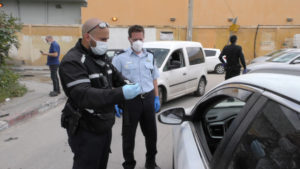
Supt. Rosenfeld looks on as a police officer enforces pandemic regulations.
TML: What does wearing masks mean? People are wearing masks on their chin. Sometimes they are covering their mouth [only]. Sometimes they aren’t covering their entire face. So, are you going to arrest somebody if they have a mask on their chin?
MR: No. What we will do is we will implement the law [and] explain first of all to the people and the public the importance of covering their mouths, covering their nose. It’s absolutely essential. The importance of social distancing is preventing a much more major crisis from taking place here in Israel. The philosophy being, we are doing everything possible.
TML: Micky, in speaking about Israel-at-large, you’ve had hotspots – the ultra-Orthodox community, the Israeli-Arab community. These pockets have shown many more people coming down with COVID[-19]…. What is being done right and what is being done wrong?
MR: What’s being done correctly is that the areas that have been on lockdown, on shutdown, those “red” zones we have mapped out geographically, we have mobilized units in the different areas to make sure that no one can come in and no one can come out unless absolutely necessary, and that means for vital food, medical help, assistance, or individuals or officers that are working for government organizations can go in. We’ve opened and closed those areas according to the numbers. We saw that once the areas were closed for a period of five to seven days, the numbers [infections] were going down. We prevented the spread. I think that is what is being done correctly. What is not being done correctly is that we have seen there has not been enough coordination between the leaders of those communities. For example, we’ve had problems within the ultra-religious Jewish neighborhoods where we’ve spoken to the rabbis and we’ve asked the rabbis to try and explain to people to keep social distancing. But until it reaches the ground within, inside the communities and within, inside the neighborhoods, the channels of communication are not exactly 100% open and I think that is due to the fact that not everybody has a mobile phone. They are very closed environments… and they’re very closed communities, so it takes time for the process to be implemented.
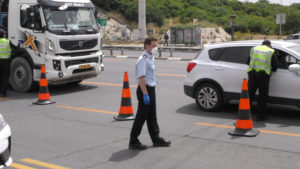
Police check vehicles during a period of lockdown.
TML: Bahrain and Qatar, two Middle Eastern countries that did mass testing, particularly of their foreign workers, found a tremendous amount of COVID[-19] among them. What has Israel done in terms of the foreign workers here? Is this something that could end up a catastrophe that is unseen?
MR: That is something that we’ve also emphasized, especially in the area of south Tel Aviv, where there are a lot of foreign workers, both from the Philippines and African countries. We are coordinating with social organizations in order to, first of all, come closer to those people. Not everybody is a legal worker. A lot of people are illegal workers, so they don’t want to come forth to the authorities and talk and explain, so we’ve increased the patrols around those areas.
TML: It seems just about anything touches on police responsibility, and by nature of the beast, the amazing number of foreign reporters begin their quest with a call to Micky Rosenfeld. How does your agency rate in terms of transparency?
MR: Everything is 100% open, much more so than in decades ago. Today, any police operation that takes place, the information is immediately put out, and I’m talking about within minutes. The only situation where the information will be held back or delayed slightly will be if there is a counter-terrorist operation taking place and there is information that we can’t give out because we’re looking for terrorists and there are still operations and therefore we don’t want to endanger our officers, but the information is put out immediately. First of all, number one, by me. All the foreign media have a close relationship… all the journalists that have come, and I’m talking about all the journalist, whether it’s European, whether it’s Asian, whether it’s American journalists. And I believe that the more transparency there is, the more understanding, the more of a bond, and the more direct and honest the reporting will be, and that is why the information is put out as quick as possible.
TML: What should they know better than to ask?
MR: I think the journalists can ask any questions they need on any subject whatsoever. Of course, there are more sensitive subjects and there is no information put out there, for example a closed investigation, whether it’s about a senior [cabinet] minister or whether it’s a senior representative. Once the investigations are closed or completed, the information will be put out. So there are certain stages and guidelines, of course coordinated with the Ministry of Justice and other organizations. The Israeli police doesn’t just work on its own, especially in complicated investigations, but apart from that, the information about operations, the information about public security, the information about the number of units, the number of activities, is totally open. I can also add and explain that the Israeli National Police have implemented over the last three years and are using more than 10,000 cameras on our police officers who are patrolling the streets. Every officer who is involved in making contact or engaging with the public has a camera on him. Everything is recorded and all the information is downloaded, both in order to understand what is taking place at the scene and how the public and a certain individual has reacted, as well as to see the police behavior. So there is an improving, ongoing implementation of what has to be done, and transparency.
TML: Over the years, Israel’s law enforcement echelon has shared its expertise with police departments worldwide. Recently, as the unrest in the US focused on police, we’ve heard that Israel has shared bad habits with their American counterparts. First of all, is that true? And tell us what is really shared with foreign agencies.
MR: The Israeli National Police have been sharing information, knowledge and experience with American organizations, counterterrorist organizations, law enforcement, as well as European [organizations] for decades. This is something that began after 9/11 and has increased over the years. We’re focused mainly on counterterrorism, counterterrorism tactics, entering and engaging [and] understanding the importance of intelligence. That when you have strong concrete intelligence and you know where a pinpointed terrorist is, you know how to engage, make that arrest or, if necessary, engage in a counterterrorist operation. We saw the gaps in America, for example, because there are so many different organizations, thousands of organizations, that the information and the intelligence might be here on the table where we are, but it won’t be transferred to another organization and operational unit out in the field because there is no connection or less connection between the two different organizations. The intelligence is transferred to the last of our officers on the ground, and therefore we are capable of succeeding and preventing those major terrorist attacks. So, in general, we’re sharing information, we’re sharing intelligence [and] we train together in the field of counterterrorism because that is, in fact, the highlight, the most important perspective, of the joint ongoing relationships with the different organizations. It will continue, and I think that what is being said over the last few months by anti-Israel, anti-American, BDS movements across America is incorrect, taken out of proportion; it is an attempt [by us] to use ongoing relationships and strengthen our constant operations and intelligence and information that we transfer. [Anti-Israel groups are] attempting to cause damage and prevent that from taking place. There’s no doubt whatsoever that the ongoing coordination and the ongoing training and the ongoing exchange will no doubt continue and even may be increased in the forthcoming years.
TML: The pushback since George Floyd was killed has been enormous in terms of the police. You’ve never seen anything like that in the United States in a very, very, long time. What’s your advice to your fellow police officers?
MR: I would personally say to the officers and the organizations overseas: “Continue to believe in what you are doing. Make sure that you maintain the exact guidelines, laws and regulations that there are, of course, on police officers and law enforcement in the same way as here in Israel. No officers should ever cross that line. They don’t have the right to. That’s part of the respect that we have to show and carry out in the field with the public we work with. It’s tremendously important to focus to know exactly what you are doing and do it for the support of the public. And anyone who doesn’t keep to those guidelines should not be on duty and should not be working.” But I also think it has to be a tremendous effort from the public as well. The public has to realize that people are serving day and night, 24/7, and are not seeing their families and are not seeing their children, and everything they are doing [is] in order to support the public. It’s for the public. It’s not for their own personal experience or their own personal daily enjoyment. I know officers and I’ve spoken to officers who have saved many lives, who have encountered numerous scenarios that we would never even want to confront – saving children, car crashes, fires, counterterrorism, making arrests, officers that have been shot and injured and have gone back to duty – those are the same officers in America that are dealing with the same issues here in Israel, and therefore officers have to be strong. And I’m hoping, and we’re hoping, that the public will go back to the way it was and will look ahead in the long term and continue to respect law enforcement in America.
TML: The public is seeing mixed messaging, sometimes the lack of a chain of command of how messages should go down; a concerted effort among organizations working together, whether it’s the government, the police, the Foreign Ministry. This happens both in the United States and what we see in Israel as well. Where does it break down and how can it be done better?
MR: Here in Israel, the Israeli police is part of the chain of the Israeli government. We know and we understand that the government and the different organizations are sitting down and talking and discussing. And we’re in a snowball effect of a situation of COVID-19, of what is happening, of what is changing. The scenarios of yesterday are different than the scenarios of tomorrow. The scenarios of tomorrow are going to be different for the next couple of weeks…. The situation could be better. We’re working together to improve. As soon as those government decisions will be made, the Israeli police will implement them immediately.
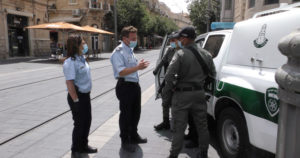
‘We’re working together to improve.’
TML: How does Micky Rosenfeld prevent the job from becoming personally overwhelming?
MR: I served in the YAMAM, the Israeli National Police Counterterrorism Unit, for nine years. I was on the front lines working and engaging, making arrests and engaging with terrorists for many years. I think that the experience that I gained there gives me the background and the confidence to deal with any given situation that can take place, any time, in any place and anywhere. And I think that is something very positive that is part of me, part of my personality, but of course, one mustn’t take anything personal, especially when you arrive at different scenes which can be complicated, which can be difficult. When you see people that have unfortunately been injured or killed, whether it’s criminal or whether it’s terrorist related, one must try and put your emotions to the side and deal with the situation. When you go home, you’re after the situation. You have to know that you’re ready for the next call. It’s going to come. It’s just a matter of time. And therefore, it’s very important to be very focused at all times. And that’s the way I function, and I’m very proud to a part of the Israeli National Police in the present position.
TML: What secrets do you have for coping with the continuous stress?
MR: I think it’s something that is what I have from inside. It’s something that is within, inside your personality. I was born in London. I left England and moved to Israel for Zionistic reasons, to serve the country. I served in the IDF, in infantry. I served in the most dangerous and complicated unit in the Israeli National Police. One specific unit. I have served many years on the scene, many years on different sites, and that is something that is part of, I think, something that is maybe – if I look back into previous generations, I have received that from my grandmother, who is an Auschwitz survivor, I have received that from my mother, I have received that from my parents, and that is something that no doubt I continue to give to my children as well.
TML: What do you do to lighten up?
MR: I like to go and enjoy nature. Breathe in the horizons. Once in a while, take time out. Keep fit for a jog. Make sure I’m ready for the next move. Make sure I’m ready for the next incident. Of course, my mobile phone is with me 24/7, which is a bit of a problem. Sometimes I have to differentiate between family life and all of a sudden there is an incident, so I have to take a break and say, “Okay, guys,” I tell my kids, “Listen, I have to take a break for a few minutes. I’m now going live. There is information which has to be put out, but it’s critical, therefore it’s a priority.” But I try and find the balance with nature and with work.
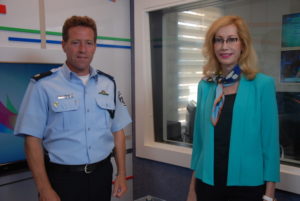
Supt. Micky Rosenfeld poses in the studio with Felice Friedson, CEO and president of The Media Line.
TML: What was the best moment you experienced on the job?
MR: Succeeding and saving lives. When I knew I would come home after a successful counterterrorist operation and I either arrested or engaged terrorists, knowing that hundreds of people were now surviving due to the fact that that terrorist was stopped and that explosion didn’t take place or that shooting attack didn’t happen. And I think those were my key and most important moments that I felt that I was serving the country throughout the years.
TML: Superintendent Micky Rosenfeld, the face of the Israeli National Police to the international press and the world, thank you for joining us here at The Media Line.
MR: Thank you very much!
TML: You’re welcome!

